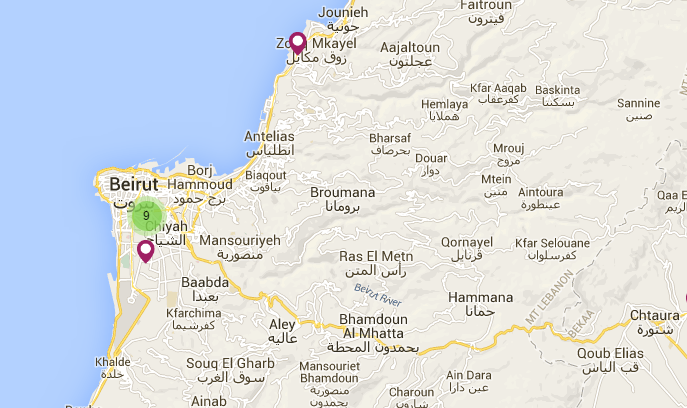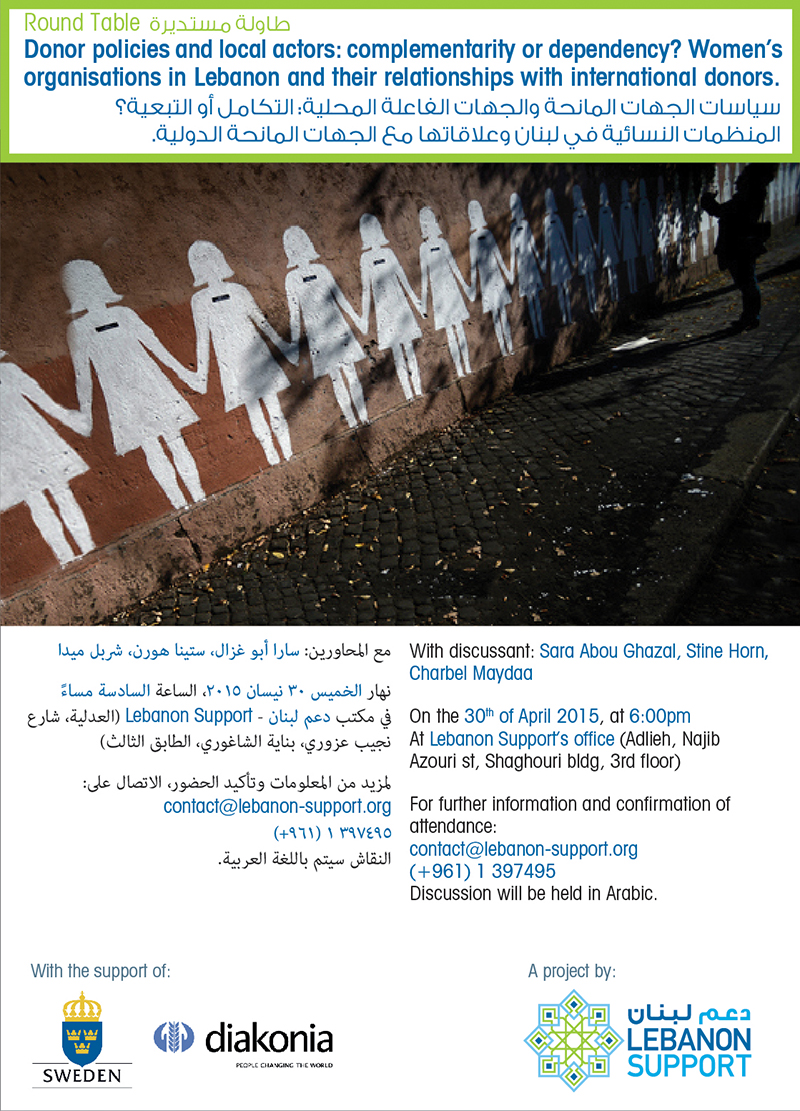Gender Equity bulletin, Issue 3, April 2015

Issue 3, April 2015
About the newsletter
Why the Gender Equity Newsletter?
This newsletter aims to connect gender actors and practitioners in Lebanon through the exchange expertise, in an attempt to create a space for better collaboration, networking, and equal access to knowledge, research, and information. Each issue will cover the work of actors, their activities, and projects, in addition to recommending relevant resources and tools, as well as information and statistics relevant to gender work in Lebanon.
The gender equity newsletter is a part of the Gender Collaborative Information and Knowledge Network- a project by Lebanon Support in partnership with Diakonia
The Gender Collaborative Information and Knowledge Network is an online collaborative platform. It is part of Lebanon Support’sCivil Society Knowledge Center (CSKC) and brings together civil society organizations, researchers, practitioners, and experts to enhance local and national capacities, improve access to knowledge and its development, and provide evidence-based research, information, and literature on gender issues and concerns.
لماذا نشرة العدالة الجندرية؟
تهدف هذه النشرة إلى الربط بين الجهات الفاعلة والعاملين في مجال إشكاليات النوع الاجتماعي في لبنان من خلال تبادل الخبرات، في محاولة لخلق مساحة للتشبيك وتفعيل التعاون، والمساواة في الوصول إلى المعرفة والأبحاث والمعلومات. يغطي كل عدد عمل الجهات الفاعلة وأنشطتها ومشاريعها، بالإضافة إلى الإيصاء بموارد وبأدوات ذات الصلة، وأيضاً المعلومات والإحصاءات ذات الصلة بالعمل في مجال إشكاليات النوع الاجتماعي في لبنان.
تشكل نشرة العدالة الجندرية جزءاً من شبكة معلومات العدالة الجندرية – مشروع لمركز دعم لبنان (Lebanon Support) بالشراكة مع دياكونيا Diakonia
ان شبكة معلومات العدالة الجندرية هي منصة تعاونية على الانترنت. وهي جزء من بوابة المعرفة للمجتمع المدني (CSKC) التابعة لمركز دعم لبنان، تجمع بين منظمات المجتمع المدني والباحثين والعاملين والخبراء لتعزيز القدرات المحلية والوطنية، وتحسين الوصول إلى المعرفة وتطويرها، وتقديم البحوث القائمة على الأدلة، بالإضافة إلى المعلومات والأدبيات في مجال قضايا النوع الاجتماعي.
1. Featured map on the Gender Equity Information & Research Network

This map has been developed in an effort to profile, and compile comprehensive information about organisations working on gender issues in Lebanon. Access the Gender actors map and look through it following this link.
Data is based on information provided by organisations and is their sole responsibility. It is still being gathered and consolidated. If you work on gender issues and wish to be listed, please send us an email to contact@lebanon-support.org.
وضعت هذه الخريطة التفاعلية عبر مسح وتجميع معلومات شاملة عن المنظمات العاملة على قضايا النوع الاجتماعي في لبنان. للوصول إلى خارطة الفاعلين في مجال الجندر انقروا على هذا الرابط.
تستند البيانات على معلومات وفّرتها المنظمات وهي وحدها المسؤولة عن محتواها، كما أن العمل لا يزال قائماً على جمعها وتوحيدها. إذا كنتن/م تعملن/ون في مجال إشكاليات النوع الاجتماعي وتتمنين/ون أن تكن/تكونون مدرجات/ين على لوائحنا، يرجى مراسلتنا على البريد الإلكترونيcontact@lebanon-support.org
2. Launch of round table series on gender projects and organisations in Lebanon

Presentation by Lebanon Support’s consultant, Dalya Mitri.
With discussants:
Sara Abou Ghazal
is a Palestinian-Lebanese writer who mostly works on feminist knowledge production. She is part of the collective Sawt Al Niswa.
Stine Horn
is the Deputy Head of Mission, Norwegian Embassy in Lebanon.
Charbel Maydaa
is the director of Mosaic organisation.
Women organisations are generally described in the region and in Lebanon in particular as thefrontrunners of emancipatory social change. Their propulsion on the global scene in the vein the Beijing Conference in 1995, has contributed to further the institutionalisation processes they had been going through since the mid 20th century. This trend gave way to the creation of project-oriented, professionalised organisations, structurally relying on international funds.
This round table will discuss the relationships between local women organisations in Lebanon with their international donors; to which extent are these organisations able to develop needs based projects and interventions? Are these projects inevitably informed by transnational and global trends? How are these interventions able to connect/ link local needs and struggles to international agendas? And more generally, it poses the issue of project based interventions versus long term strategies.
This round table is part of a series in the frame of the Gender Equity Information & Research Network project.
The discussion will be held in Arabic.
Date: Thursday, 30th of April 2015, at 6:00pm
Location: Lebanon Support’s office (Adlieh, Najib Azouri st, Shaghouri bldg, 3rd floor - follow this link for the map)
For further information and confirmation of attendance, contact us on: contact@lebanon-support.org
تعرضها الباحثة في مركز دعم لبنان (Lebanon Support) ، داليا متري.
مع المحاورين:
سارا أبو غزال
وهي كاتبة فلسطينية لبنانية تعمل على المواضيع النسوية. هي جزء من مجموعة صوت النسوة.
ستينا هورن
وهي نائب رئيس بعثة السفارة النروجية في لبنان.
شربل ميدع
وهو مدير جمعية موزايك - Mosaic.
توصّف المنظمات النسائية عموماً في المنطقة، وفي لبنان على وجه الخصوص، باعتبارها المتصدرة لعملية التغيير الاجتماعي التحرري. وقد ساهم تقدمها على الساحة العالمية، في سياق مؤتمر بكين عام ١٩٩٥، في الدفع بعمليات المأسسة قدماً، تلك التي كانت قد بدأت منذ منتصف القرن العشرين. سمح هذا الاتجاه في خلق منظمات ذات طابع تخصّصي وموجهة نحو المشاريع وتعتمد بنيوياً على التمويل الدولي.
تسعى هذه الطاولة المستديرة الى مناقشة العلاقات بين المنظمات النسائية المحلية في لبنان والجهات المانحة الدولية؛ إلى أي مدى تعتبر هذه المنظمات قادرة على تطوير مشاريع وتدخلات مستندة إلى الاحتياجات؟ وهل هذه المشاريع يتم بناؤها حتماً وفقاً الاتجاهات العابرة للدول والعالمية؟ كيف تقدر هذه التدخلات على الوصل بين الاحتياجات والنضالات المحلية والأجندات الدولية؟ وبشكل أعم، تطرح هذه الطاولة إشكالية التدخلات القائمة على المشاريع مقابل الاستراتيجيات الطويلة الأمد.
وهذه الطاولة المستديرة جزء من سلسلة في سياق مشروع شبكة معلومات العدالة الجندرية.
سيتم النقاش باللغة العربية.
نهار الخميس ٣٠ نيسان ٢٠١٥، الساعة السادسة مساءً
في مكتب دعم لبنان - Lebanon Support (العدلية، شارع نجيب عزوري، بناية الشاغوري، الطابق الثالث، رابط للخريطة)
لمزيد من المعلومات وتأكيد الحضور، يرجى الاتصال على: contact@lebanon-support.org
3. FOCUS ON:
Sawt Al Niswa
a. Sawt al Niswa (SAN) is a community of feminist writers, activists and artists from the Middle East based in Lebanon. SAN works on producing feminist knowledge.
b. In 2013, SAN launched a pilot project entitled “Feminism 101” (F101). The collective is aiming to develop further the project for the upcoming summer. F101 gives informal educative courses on feminism influenced and processed by SAN's pool of knowledge. It offers lessons in feminist politics, economy and environment.
c. Challenges:
The sectarian patriarchal system and its values constitute the main challenges of achieving any equality, not only gender equality. SAN believes in nurturing a culture of resistance in which we are able to create livable examples of producing feminist knowledge, and creating relationships and structures that are not embedded in this system.
d. SAN considers that the main demands of women’s organizations in Lebanon should be the following:
1- Gender equality (social, economic and political-- including the right to nationality).
2- Encouraging more grassroots feminist writing and researching.
3- Sexual rights in laws and social attitudes; and the right of people to choose their gender and sexual identities.
4- Protection and inclusion of migrant domestic workers in the labor law.
5- Right to live free of all forms of violence (domestic violence; state violence; sexual harassment etc.).
[link to Daleel Madani profile]
صوت النسوة
أ. صوت النسوة (ص.ن.) هي مجموعة من الكاتبات والناشطات والفنانات النسويات من الشرق الأوسط والموجودات في لبنان. تعمل ص.ن. على انتاج معرفة نسوية.
ب. في عام 2013، أطلقت ص.ن. مشروعاً تجريبياً بعنوان "النسوية 101" (F101). تتطلع المجموعة الى تطوير المشروع في فصل الصيف القادم. يقدم F101 دورات تعليمية غير رسمية بشأن النسوية موحاة ومعالجة عبر الخبرة المعرفية لدى ص.ن.، ويتضمن دروساً في السياسة النسوية والاقتصاد والبيئة.
ج. التحديات
يشكل النظام الطائفي الأبوي وقيمه التحدي الرئيسي أمام تحقيق أي ماساوة، وليس فقط المساواة الجندرية. تؤمن ص.ن. بتنشئة ثقافة مقاومة قادرة على خلق أمثلة على انتاج معرفة نسوية ورسم علاقات وبنى غير مرسّخة في هذا النظام.
د. تعتقد ص.ن. بأن المطالب الرئيسية للمنظمات النسائية في لبنان يجب أن تكون على النحو التالي:
1- المساواة الجندرية (على المستويات الاجتماعية والاقتصادية والسياسية – بما في ذلك الحق في الجنسية).
2- التشجيع على المزيد من الكتابة والبحوث النسوية المنطلقة من القواعد الشعبية.
3- الحقوق الجنسية في القوانين وفي المواقف الاجتماعية، وحق الناس في اختيار نوعهم الاجتماعي وهويتهم الجنسية.
4- حماية وشمل عاملات المنازل المهاجرات ضمن قانون العمل.
5- الحق في حياة خالية من جميع أشكال العنف (العنف الأسري، عنف الدولة، التحرش الجنسي، الخ.)
[رابط إلى صفحة صوت النسوة على دليل مدني]
4. Gender news
• From Lebanon
General Security Directorate interrogated human rights’ activists on the basis of campaigning for migrant domestic workers’ rights in Lebanon. The investigations relate to the case of Suzanna Kumar and her mother, Renuka Irangani, being denied of the renewal of their residency. It is worth mentioning that Renuka and her husband were released after a lawsuit was filed by Insan Association.
The Lebanese Center for Human Rights (CLDH) found that 52% of women arrested in Lebanon in 2013 and 2014 were severely tortured by the security forces during investigations. Beatings, deprivation and suspensions - humiliation, threats and insults - violations of privacy by male investigators or guards; these are the main methods of torture and ill-treatment suffered by the majority of women interviewed by CLDH and documented in this report launched on April 16, 2015.
Personal status laws discriminate against women across the religious spectrum and don’t guarantee their basic rights, Human Rights Watch said in a report about women’s rights in Lebanon released in January 2015.
• Around the world
Prominent Lawyer and Woman Human Rights Defender Mrs. Azza Soliman was officially declared defendant after giving her testimony in the killing of activist Mrs. Shaimaa ElSabbagh, who was shot dead by a police officer during a sit-in commemorating the 2011 revolution’s anniversary.
Egypt’s Ministry of Social Solidarity is investigating a non-governmental organization after receiving a complaint that it is involved in promoting safe sex among same sex partners and raising awareness regarding sexually transmitted diseases.
Following the World Social Forum, that took place in Tunis in March 2015,AWID looks back at the Women’s Assembly and discusses some of the issues and challenges of building a feminist movement within the alter-globalization space.
Malta adopted a ground-breaking gender recognition law. TheGender Identity, Gender Expression, and Sex Characteristics Actintroduces, among other measures, the right to determine gender identity based on self-determination instead of undergoing invasive medical procedures.
أخبار من لبنان •
استجوبت المديرية العامة للأمن العام ناشطين في مجال حقوق الانسانفي سياق حملات المدافعة عن حقوق عاملات المنازل المهاجرات في لبنان. تتعلق هذه التحقيقات بقضية سوزانا قومر ووالدتها،رينوكا ايرنغاني، ورفض الامن العام تجديد إقامتيهما. تجدر الإشارة إلى أنه تمإطلاق سراح رينوكا وزوجها بعد أن تقدمت جمعية إنسان بشكوى.
كشف المركز اللبناني لحقوق الإنسان، في تقرير نشر في نيسان ٢٠١٥، أن ٥٢٪ من النساء اللواتي تم توقيفهنّ خلال عامي ٢٠١٣ و٢٠١٤ تعرضن للتعذيب الشديد من قبل قوى الأمن خلال التحقيقات. وتتضمن طرق التعذيب الضرب والحرمان والتعليق، والاذلال و التهديد والشتم، وانتهاكات الخصوصية من قبل محققين ذكور.
كشفت هيومن رايتس ووتش Human Rights Watch في تقرير عن حقوق المرأة في لبنان، تم نشره في كانون الثاني ٢٠١٥ أن قوانين الأحوال الشخصية تميّز ضدّ كل النساء بغضّ النظر عن الدين ولا تؤمنّ حقوقهنّ.
أخبار من حول العالم •
أعلنت المحامية البارزة والمدافعة عن حقوق المرأة، السيدة عزة سليمان، رسمياً مدعى عليها، بعد أن قدمت شهادتها في قضية قتل الناشطة السيدة شيماء الصباغ، التي أطلق النار عليها أحد عناصر الشرطة خلال اعتصام في ذكرى ثورة ٢٠١١.
تجري وزارة التضامن الاجتماعي في مصر تحقيقاً مع منظمة غير حكومية بعد تلقّيها شكوى بأن المنظمة المذكورة تشجّع على الممارسات الآمنة للجنس بين شركاء من نفس الجنس وتنشط للتوعية حول الأمراض المنقولة جنسياً.
تراجع جمعية حقوق المرأة في التنمية (Association for Women's Rights in Development -AWID) الجمعية العامة النسائية خلال المنتدى الاجتماعي العالمي، المنعقد في تونس في آذار 2015، وتناقش بعض القضايا والتحديات التي تواجه بناء حركة نسوية داخل الفضاء المطالب بعولمة بديلة.
اعتمدت دولة مالطا قانوناً رائداً للاعتراف بالنوع الاجتماعي. يدخل قانون الهوية الجندرية والتعبير الجندري وخصائص الجنس، من بين تدابير اخرى، مفهوم الحق بتقرير الهوية الجندرية على أساس الحق في تقرير المصير بدلاً من الخضوع للإجراءات الطبية التي تنتهك الخصوصية.

